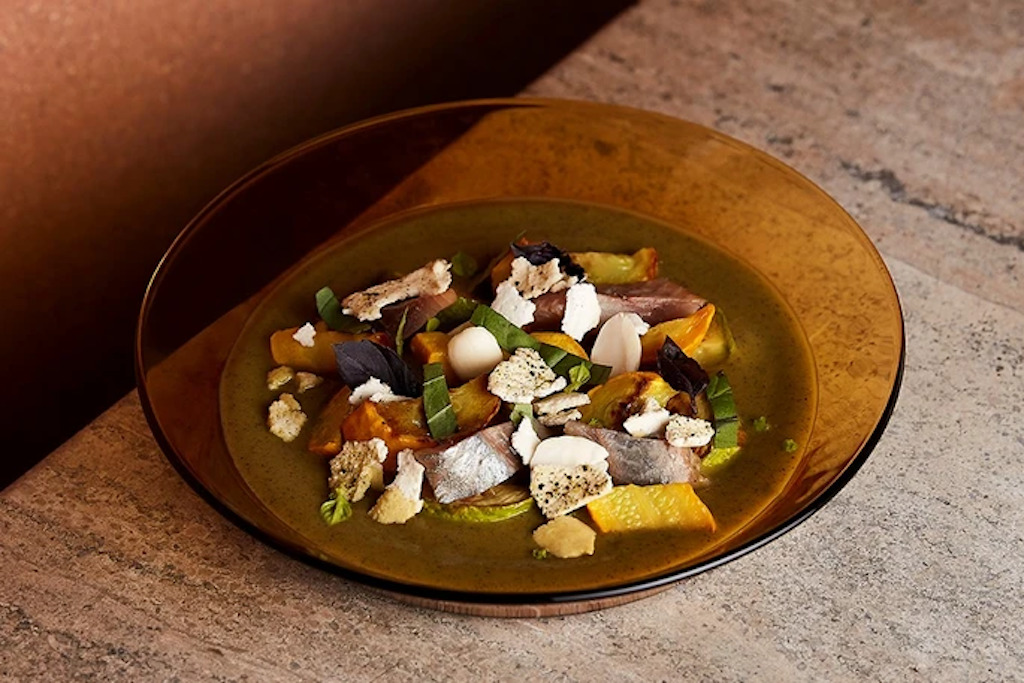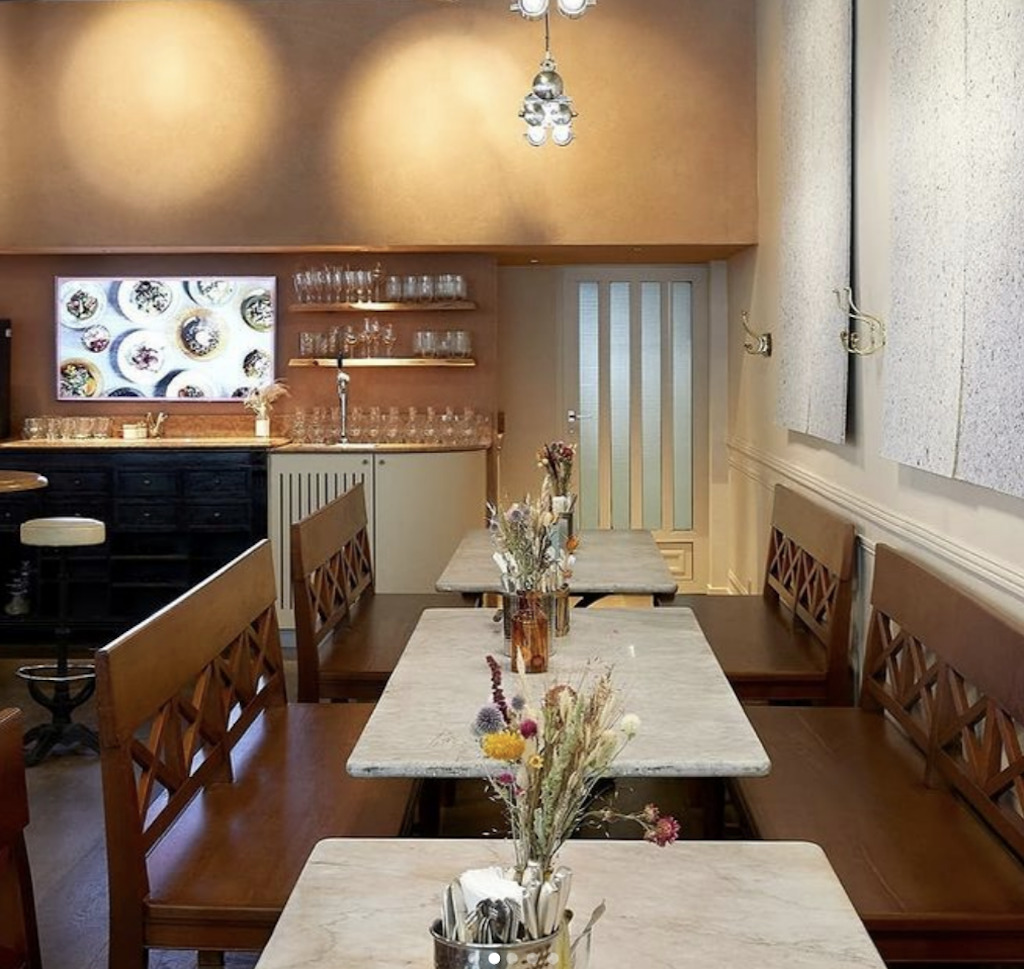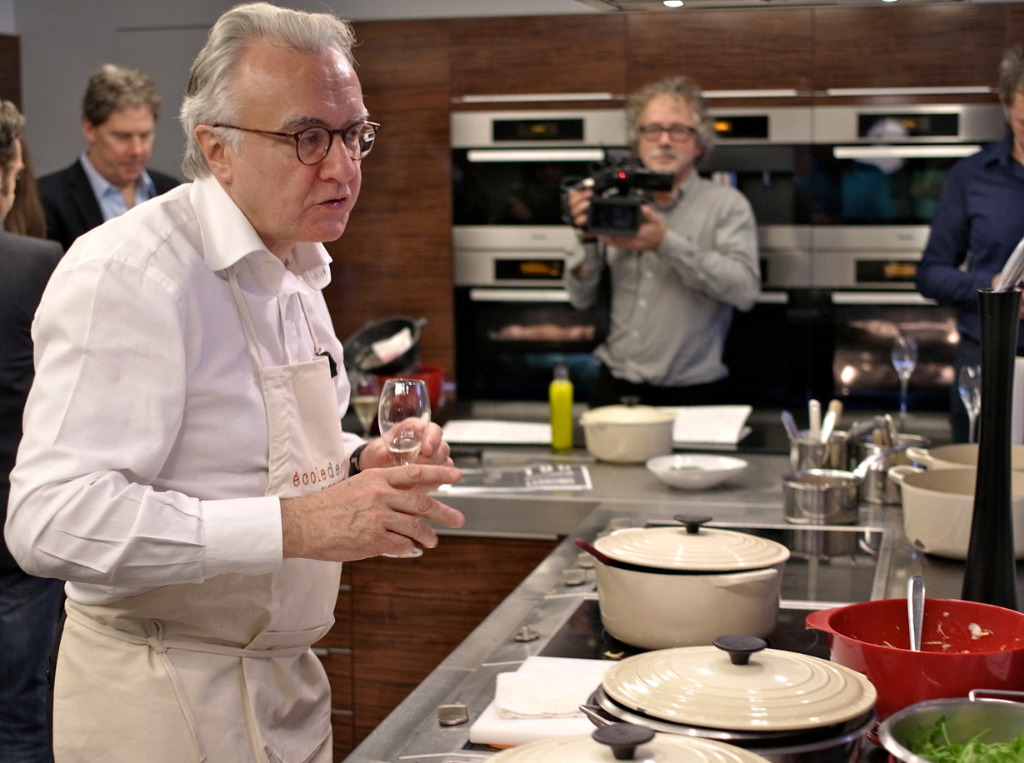5 Mins Read
Speaking at France’s inaugural Sustainable Gastronomy Summit, Monégasque chef Alain Ducasse called on the world to eat less meat. Highlighting how it would be better for both human and planetary health, the 21-Michelin-starred chef advocated for an 80/20 ratio of plant to animal protein.
Ducasse told French newspaper Le Figaro that animal protein harms both the planet and our health, and haute gastronomy must lead the charge and influence the restaurant industry to transition towards a plant-forward diet.
In 2014 – long before plant-based diets entered the mainstream restaurant consciousness in France – he removed meat from the menu at his flagship eponymous restaurant in Paris’s Plaza Athénée, instead embracing a menu confined to vegetables, sustainable seafood and grains, going as far as to describe it as more ‘natural’ food.
“When I was little, on the farm, every day at 11 am, my grandmother took me to the garden and wondered: ‘What are we eating today?’ It was a kitchen of necessity – naturalness before its time,” he told Le Figaro, adding: “We must reverse the proportions that we see everywhere and move towards a ratio of 80% vegetable to 20% animal protein. We don’t need to eat animal proteins every day.”
Meat is bad for the planet
Research has shown that animal-derived foods cause twice as many emissions as plant-based foods and that vegan diets can reduce emissions, water pollution and land use by 75% compared to meat-rich diets. When asked if he thinks people should stop eating meat completely, Ducasse responded: “I am not an ayatollah of veganism, but it is necessary to realise that we must eat meat in less quantity, but of better quality. And so that they can produce this quality, French farmers must be paid fairly.”
It comes on the heels of France’s U-turn on factory farming last month, with its agricultural minister calling for farmers to eschew quality and instead produce cheaper and higher quantities of meat. It followed a proposed ban on the use of meat-related terms on plant-based alternatives submitted by the French government to the EU Commission.

As for meat reduction, a recent peer-reviewed study found that replacing 50% of our meat and dairy consumption with plant-based alternatives could reduce agricultural and land-use emissions by 31%, shrink the total agricultural area by 12%, and halt the destruction of forest and natural land.
“How can chefs import fatty beef from Japan knowing the cost that transporting it inflicts on the planet? It’s probably chic, but I prefer beef [from] Normandy. Not to mention the burgers that proliferate among my colleagues: fatty, soft, sweet… That’s not the point of the story. The long shadow of haute cuisine must be a stain of… olive oil,” said Ducasse.
Local sourcing is key
The 67-year-old said he looked up to Sydney restaurant St Peter’s Josh Niland, who “doesn’t throw away any part” of the fish being cooked in the eatery. “Rather than ham with butter and lettuce, tomorrow’s diet will be made with fish and butter and seaweed salad.”
He added: “We must be careful not [to] take too much from the land and the sea. Not to mention that there is as much plastic as fish in our oceans, which are the lungs of the planet. For fishing, you have to turn to deep-sea or river species that are not overexploited.”
Overfishing is a massive problem, as it is responsible for supply chain disruptions and destroying biodiversity, according to one alt-seafood brand. Ducasse stresses that we should promote reasonable breeding.
“It is better to farm shrimp in the Atlantic than to import them from Madagascar. And we must also take responsibility and not pass off farmed sea bass as wild sea bass on the stalls! We must decide to feed ourselves differently, not like rich countries that want everything, all the time. It is difficult not to make a link between the billion obese and the 800 million undernourished on the planet.”

Alain Ducasse’s sustainability initiatives
The interview touched upon Ducasse’s own impact on the climate and whether his restaurants stick to this philosophy. In 2021, he opened the plant-forward restaurant Sapid in Paris, with dishes like lentil bolognese and tomato and watermelon salad based on that same concept of naturality – which he defines as “preparing good food for people’s health and good for the planet”.
“At Le Louis XV with Emmanuel Pilon and at Le Meurice with Amaury Bouhours, we have reduced the portions of fish and meat. 70g of animal protein on a plate is enough,” notes Ducasse. “At Sapid, our Parisian refectory, our menu – created with Romain Meder – is 80-85% vegan, in a room decorated with cob walls, secondhand furniture and crockery.”
He continued: “I also developed the Burgal, a burger topped with a vegetable pancake in a low-gluten bun [he launched the vegan burger kiosk in the French capital’s Bastille neighbourhood last year]: we distribute 1,000 per day in Business Air France lounges. And I’m working on opening a restaurant dedicated to [it]. I have also developed a white-label Mediterranean restaurant concept where animal proteins only occupy 15% of the menu.”
As for his own personal carbon footprint, he admitted in the interview that he flies a lot, having just come back from the Amazon where he “saw ravages of deforestation” – the rainforest is approaching a tipping point that could see it no longer be able to sustain itself. “I try to compensate for these excesses,” says Ducasse adding that “in Paris, I drive a 100% electric car.”
While that wouldn’t necessarily offset his flying emissions – according to some estimates, it would take two years of driving an electric car to offset emissions from flying to Manaus (at the heart of the rainforest) from Paris – cutting meat would definitely help. After all, livestock farming accounts for 11-19% of total greenhouse gas emissions. And meat contributes to 60% of all food emissions, which in turn make up about a third of all emissions. As Ducasse said, “we must be careful” indeed.
In an interview with food systems journalist Thin Lei Win, former James Beard exec, and communications expert Katherine Miller talks about how important chefs are to food systems change. “Chefs can help translate what goes into producing our food to what is on our dinner table – and can help us all understand how food policy, from cottage food laws to global fishery management treaties, affects what is available to us and at what cost,” she writes in her new book At The Table: A Chef’s Guide to Advocacy, a tome packed with insights and advice for industry professionals.
Ducasse joins a handful of Michelin-starred chefs who have taken up this mantle and pivoted to a vegetable-centric philosophy in recent years, from chef Daniel Humm’s New York City’s 100% vegan Eleven Madison Park to chef Rasmus Kofoed of Geranium in Copenhagen, named the best restaurant in the world, whose menu is meat-free.



